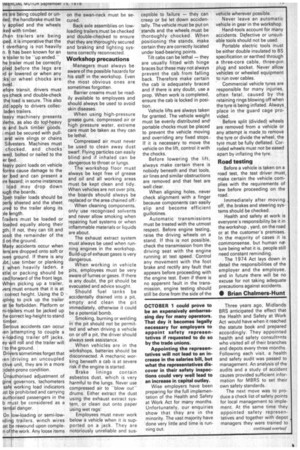OCTOBER 1 could prove to be an expensively embarrassing day
Page 81

Page 82

If you've noticed an error in this article please click here to report it so we can fix it.
for many operators. That day it becomes legally necessary for employers to appoint safety representatives if requested to do so by the trade unions.
Appointing the representatives will not lead to an increase in the salaries bill, but what the representatives discover in their safety inspections could very well lead to an increase in capital outlay.
Wise employers have been preparing for the full implementation of the Health and Safety at Work Act for many months. Unfortunately, our enquiries show that they are in the minority. The vast majority have 'done very little and time is running out. Three years ago, Midlands BRS anticipated the effect that the Health and Safety at Work Act would have when it reached the statute book and prepared accordingly. They appointed health and safety consult.nts who visited all of their branches and depots every three months. Following each visit, a health and safety audit was passed to management. An analysis of the audits and a study of accident causes provided sufficient information for MBRS to set their own safety standards.
The next move was to produce a check list of safety points for local management to implement. At the same time they appointed safety representatives and together with depot managers they were trained to carry out the safety audit that had previously been done by the consultants.
. The success of any new venture involving staff working conditions or working environment depends largely on the co-operation of the staff and MBRS ensured full co-operation by organising two one-day conferences for all levels of employees.
Mr G. Brown of MBRS said, "If you give the staff a lead in matters like this they will willingly follow and co-operate." He pointed out that accidents took place in the area where fork-lift trucks are being driven on an all-too-regular basis.
It was then discovered that almost anyone was permitted to jump on to a fork-lift and drive it. MBRS decided that everyone who might require to move a forklift truck should be trained to the standard of a skilled driver. The result is that the accident rate in this area has fallen dramatically.
On the question of costs, Mr Brown argues that accident prevention costs little in relation to overall operating costs. Weekly cleaning of maintenance pits, for example, carries a measur able labour cost, but when set against the cost of an accident, the expenditure becomes insignificant.
'One accident in,,olving a fitter means upsetting our maintenance schedule and courld result in vehicles standing in the workshop awaiting repair,'" he said. In addition to sick pay and loss of use of the vehicle, there are many other items of expenditure which result from even the most simple accident.
The principal factor in accident prevention, and that is the objective of the Health and Safety at Work Act, is education and not capital outlay, said Mr Brown. Existing equipment can be modified to meet the requirements, staff can be trained-in good housekeeping so that excessive cleaning can be avoided, and working methods can be changed after examination.
Where accident analysis shows that there is a recurring pattern in accidents, appropriate action is taken to eliminate the cause. However, if the analysis shows that even one simple type of accident could have been avoided, he takes steps to stop it happening again.
Mr Brown was unable to say in specific terms how much the company had saved as a result of the introduction of accident analysis but he was emphatic that savings had resulted.
Because Midlands anticipated the requirements of the Act, they were able to introduce their safety methods and safety Code of Practice gradu There was no great rush ti come involved in capital ex diture and as Mr Brown poi out, because the expend was gradual and contro there was no need to rr monumental increases operating costs to meet safety bill.
• lain Sher




























































































































